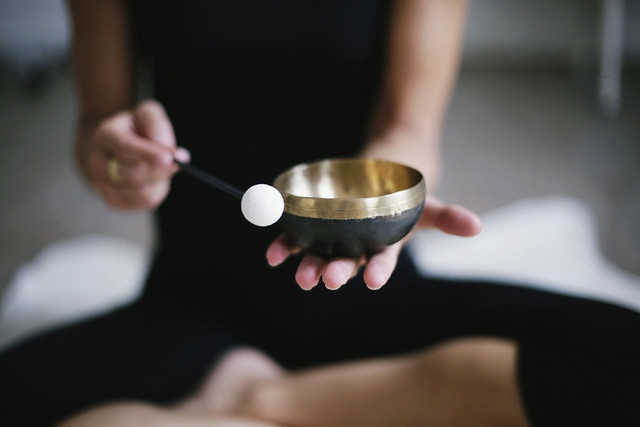Everyone gets stuck in a sad rut sometimes. Keep reading to get inspiration and techniques on how to get out of your head.
It happens to all of us. Whether it’s depression, anxiety, insecurity, or stress, we all face difficult times where we need to lift our mood and shift our energy. Techniques for getting out of your head are hugely important practices to incorporate into your life.
Though it’s easy to dwell on negative thoughts and experiences, this can be a bad habit that can lead to thought patterns that spiral out of control. To combat this, we’ve compiled a list of 9 effective ways to get out of your head.
1. Focus on Something Else

(Foto: CC0 / Pixabay / Foundry)
This is easier said than done, but there are many different ways you can get out of your head by shifting your focus to something else.
Here are a few simple activities you can try to help:
- Have a conversation with a friend (this can be in person or on the phone).
- Read a book; ideally something on the positive side. Try to avoid novels with dark themes during difficult times.
- Sign up for volunteer work in your community.
- Try a new recipe.
- Listen to a podcast and go on a walk. Again, choose a topic that is lighter such as a storytelling podcast or check out one of the top 20 sustainability podcasts we’ve compiled to listen to in 2022.
- Learn a new language.
- Get into a new hobby or get back into a hobby you already like.
2. Get into Nature



(Foto: CC0 / Pixabay / Hermann)
Spending time in nature has been proven to benefit mood disorders. Whether it’s hiking, trail running, mountain biking, or fishing, there are many activities you can do in nature that can help you get out of your head. The list of cognitive benefits of getting outside is quite extensive. It can improve attention spans, lower stress, improve mood, increase empathy, and cooperation.
Don’t try to rush your outdoor time either. Take a leisure walk in the woods or urban park and take in the different plants and colors you see and take deep breaths. It seems very simple, but taking a walk has many benefits.
3. Exercise



(Foto: CC0 / Pixabay / StockSnap)
Studies show that people who exercise regularly or at least three times a week have better mental health. It’s been shown to help with anxiety, sleep problems, prevent chronic disease, and depression. Perhaps most importantly, it can help improve one’s self-esteem and wellbeing in general.
Exercise is a great way to begin to get out of your head and when you’re able to find a routine that works for you, the health benefits are well worth the work put in.
4. Meditate



(Foto: CC0 / Pixabay / Binja69)
Meditation is a practice that dates back thousands of years and has gained in popularity for its health benefits over the past decades. It’s simple, can be done anywhere, and requires nothing but yourself.
Meditation can reduce stress, anxiety, symptoms of depression, improve self-esteem, and even increase kindness. If you want to get out of your head, try incorporating meditation into your life.
There are many ways to meditate as well. You can find different free guided meditations on the internet, give a meditation app a try (many have free trials), find a class in your community, or simply try to meditate on your own. If you meditate on your own, there are also many techniques and practices for this. The most basic one is sitting in silence and emptying your mind of thought. While this can be incredibly difficult even for the experienced meditators, just remember to focus on your breath and when you trail off into thought, let it go and return to a quiet mind.
5. Acknowledge Your Feelings



(Foto: CC0 / Pixabay / 1388843)
To get out of our heads, sometimes we need to get in our bodies. This one can be difficult, but be an effective way to get out of your head for a long time. If there is a specific experience or feeling that’s bothering you it can be emotionally helpful to acknowledge it in order to move on. Many of us are taught to not share or dwell on our emotions, but this can have negative effects psychologically.
Instead, it can be helpful to focus on your feelings and remember it’s okay to feel this way. it’s a natural response to difficulties that life sometimes brings. If it weren’t for these difficult times, we might not appreciate the good parts of life.
Just remember not to overanalyze or use negative self-talk when giving your emotions space to breathe. Talk to yourself gently and give yourself time for emotions to change.
6. Practice Gratitude



(Foto: CC0 / Pixabay / avi_acl)
Practicing gratitude can give us a fresh perspective and help us remember the good parts of our lives. You can practice gratitude by writing a short list of what you’re grateful for in the morning or, before going to sleep, think of what you’re thankful for having happened that day. To start, check out our guide on how to practice gratitude on a daily basis.
7. Journal



(Foto: CC0 / Pixabay / Pexels)
Journaling not only help with getting out of your head, it can improve self-confidence, improve writing skills, be a creative outlet, reduce stress, and strengthen memories. Your journal entries can be as long or short as your please. You can include forms of self-expression such as poems, short stories, illustrations, or just keep to writing about how you feel and what’s happening in your life.
If you’ve never journaled before and need inspiration on how to start, read our guide: How To Write a Journal and Make it a Habit.
8. Talk it Out



(Foto: CC0 / Pixabay / stevepb)
Whatever problem you may be facing, it can be relieving to talk out your feelings and worries with someone. If you bottle up your emotions rather than dealing with them, this can increase anxiety, stress, and depression.
Some issues we can resolve by talking it out with a friend or family member, but some of us may need professional help through therapy. If your problem isn’t going away after trying some of these techniques and causes mental or physical health issues, you should probably seek a therapist that can help direct you towards a solution and address the root of your stress.
Talking over an experience or emotions that you’ve experienced can help validate whatever it is you’ve gone through. This is a crucial part of the healing process for many.
9. Learn to Live in the Present



(Foto: CC0 / Pixabay / vokra)
Each of these practices contribute to a better way to live in the present and get out of your head. It’s all about changing habits, thought patterns, and learning new healthy ways to cope.
Whether you do this by incorporating gratitude, a bit of meditation, physical activity, learning a new skill, or having a deep conversation with a family member or roommate, these practices can be done in many different ways. It’s all about what works for you.
The longer your practice different methods of learning to live in the present, the easier it will be to get out of your head.
Read More:
- How to Improve Concentration: 10 Ways to Focus Better
- Calming Tea: Varieties to Help with Stress and Anxiety
- What is Slow Living – and How Do You Slow Down?
Important Information regarding Health-related Topics.
** Links to retailers marked with ** or underlined orange are partially partner links: If you buy here, you actively support Utopia.org, because we will receive a small part of the sales proceeds. More info.Do you like this post?







